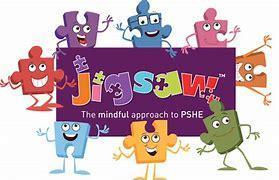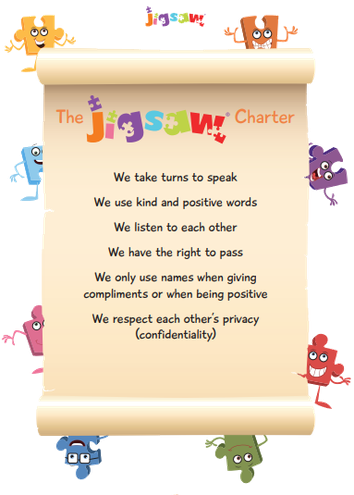PSHE - JIGSAW
PSHE Education at Hanburys Farm and Oakhill Federation of schools.
PSHE education (Personal, Social, Health and Economic Education) is a planned programme of learning through which childre acquire the knowledge, understanding and skills they need to successfully manage their lives, now and in the future. As part of a whole school approach, PSHE Education develops the qualities and attributes pupils need to thrive as individuals, family members and members of the wider community and society.
What do schools have to teach in PSHE?
The National Curriculum stipulates that schools have to teach a broad and balanced curriculum that promotes and teaches:
spiritual, moral, cultural, mental and physical well being.
This teaching should prepare children for ther responsibilites and experiences of later life.
It is mandatory that PSHE teaching promotes and teaches about British Values.
From September 2020 primary schools in England are required to teacher Relationships and Health Education as a compulsory subject. The Department of Education strongly recommends that should also include age appropriate Sex Education. (See PSHE policy for details)
Schools also have the statutory responsibility to Safeguard their pupils (Keeping Children Safe in Education, DfE, 2019)(KCSIE 2021) and to uphold the Equality Act (2010)(Link)
The Jigsaw programme supports all the legislation.

What is Jigsaw?
Jigsaw, 'the mindful approach to PSHE', is a comprehensive programme of work (including teaching and learning resources and assessment processes) for Personal, Social, Health and Economic education (PSHE) for primary schools. The 6 units (known as Puzzles), each lasting for half a term, progressively build children’s learning from the beginning to end of the school year, every year group studying the same unit at the same time at their own developmental level. This encourages a whole-school approach and enables learning themes to be highlighted, children to work together across year groups, and teachers to differentiate materials. The entire programme is underpinned by mindfulness philosophy and practice.
The 6 Puzzles are:
- Being me in my World - Includes understanding my place in the class, school and global community as well as devising Learning Charters.
- Celebrating Difference - Includes anti-bullying (cyber and homophobic bullying included) and diversity work.
- Dreams and Goals - Includes goal-setting, aspirations for individuals and the world and working together.
- Healthy Me - Includes drugs and alcohol education, self-esteem and confidence as well as healthy lifestyle choices.
- Relationships - Includes understanding friendship, family and other relationships, conflict resolution, communication skills and bereavement, loss and change.
- Changing Me - This puzzle includes sex and relationships education in the context of coping positively with change.
These are designed to cover all aspects of PSHE, with particular attention to social skills and emotional literacy, spiritual, moral, social, and cultural (SMSC) development, British values and personal development. There is a safeguarding strand running throughout. Each Puzzle has 6 Pieces (lessons), making 36 Pieces for each year group.
The JIGSAW charter

